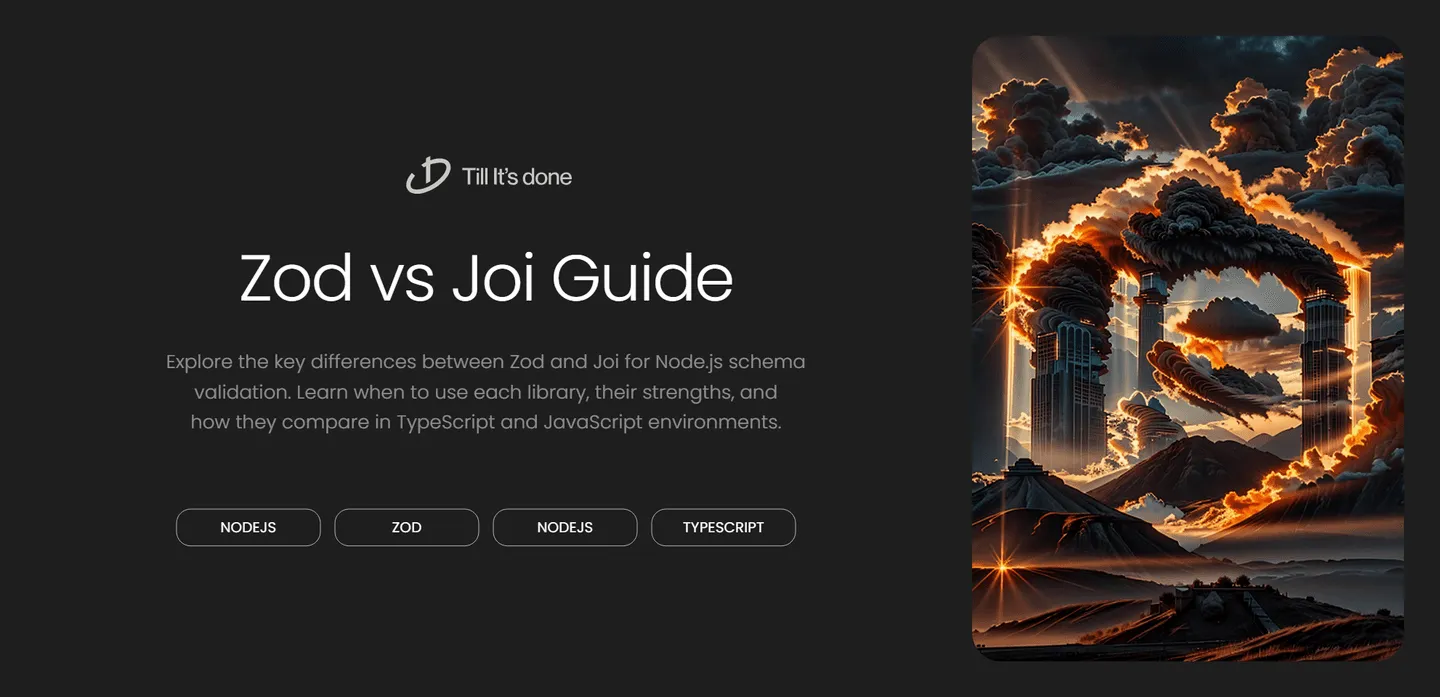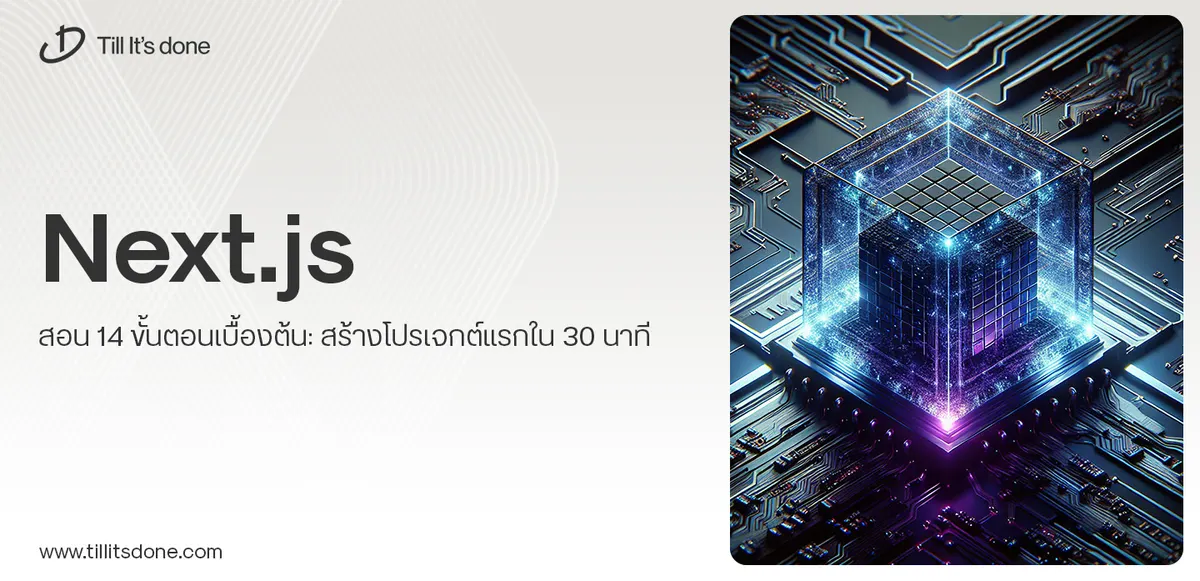- Services
- Case Studies
- Technologies
- NextJs development
- Flutter development
- NodeJs development
- ReactJs development
- About
- Contact
- Tools
- Blogs
- FAQ
Zod vs Joi: NodeJS Schema Validation Guide
Learn when to use each library, their strengths, and how they compare in TypeScript and JavaScript environments.

Zod vs Joi: A Comparison of Schema Validation Libraries for Node.js

In the ever-evolving landscape of Node.js development, data validation remains a crucial aspect of building robust applications. Two popular libraries have emerged as frontrunners in this space: Zod and Joi. Today, we’ll dive deep into their differences, strengths, and use cases to help you make an informed decision for your next project.
The Rise of Type-Safe Validation
Before we dive into the comparison, let’s understand why schema validation has become increasingly important. As applications grow in complexity, ensuring data consistency and type safety becomes paramount. Both Zod and Joi aim to solve this challenge, albeit with different approaches.

Zod: The TypeScript-First Approach
Zod has gained significant traction, especially among TypeScript developers, and for good reason. It was built from the ground up with TypeScript in mind, offering first-class type inference and seamless integration with TypeScript projects.
Key Features of Zod:
- TypeScript type inference out of the box
- Zero dependencies
- Rich error messages
- Composable schema definitions
- Async validation support
Consider this example of Zod in action:
import { z } from 'zod';
const UserSchema = z.object({ name: z.string().min(2), email: z.string().email(), age: z.number().min(18).optional(), hobbies: z.array(z.string())});Joi: The Battle-Tested Validator

Joi, on the other hand, has been around longer and has proven itself in countless production environments. It offers a more extensive API and is particularly popular among JavaScript developers who don’t necessarily need TypeScript integration.
Key Features of Joi:
- Extensive validation rules
- Rich ecosystem and plugins
- Detailed error messages
- Custom validation functions
- Schema composition
Here’s how you’d define a similar schema in Joi:
const Joi = require('joi');
const userSchema = Joi.object({ name: Joi.string().min(2).required(), email: Joi.string().email().required(), age: Joi.number().min(18).optional(), hobbies: Joi.array().items(Joi.string())});Making the Choice
The decision between Zod and Joi often comes down to your specific needs:
Choose Zod if:
- You’re working with TypeScript
- You value minimal dependencies
- You need strong type inference
- You prefer a more modern API design
Choose Joi if:
- You’re working in a JavaScript environment
- You need extensive validation rules out of the box
- You value a mature ecosystem
- You require complex validation scenarios
Performance and Bundle Size
While both libraries are performant, Zod generally has a smaller bundle size due to its zero-dependency approach. Joi, while larger, includes more features out of the box. In most applications, the performance difference won’t be noticeable, so it’s better to choose based on your functional requirements.
Conclusion
Both Zod and Joi are excellent choices for schema validation in Node.js applications. Zod’s TypeScript-first approach and modern API design make it particularly attractive for new projects, especially those using TypeScript. Meanwhile, Joi’s maturity and extensive feature set continue to make it a solid choice for JavaScript projects requiring complex validation rules.

 สร้างเว็บไซต์ 1 เว็บ ต้องใช้งบเท่าไหร่? เจาะลึกทุกองค์ประกอบ website development cost อยากสร้างเว็บไซต์แต่ไม่มั่นใจในเรื่องของงบประมาณ อ่านสรุปเจาะลึกตั้งแต่ดีไซน์, ฟังก์ชัน และการดูแล พร้อมตัวอย่างงบจริงจาก Till it’s done ที่แผนชัด งบไม่บานปลายแน่นอน
สร้างเว็บไซต์ 1 เว็บ ต้องใช้งบเท่าไหร่? เจาะลึกทุกองค์ประกอบ website development cost อยากสร้างเว็บไซต์แต่ไม่มั่นใจในเรื่องของงบประมาณ อ่านสรุปเจาะลึกตั้งแต่ดีไซน์, ฟังก์ชัน และการดูแล พร้อมตัวอย่างงบจริงจาก Till it’s done ที่แผนชัด งบไม่บานปลายแน่นอน  Next.js สอน 14 ขั้นตอนเบื้องต้น: สร้างโปรเจกต์แรกใน 30 นาที เริ่มต้นกับ Next.js ใน 14 ขั้นตอนเพียงแค่ 30 นาที พร้อม SSR/SSG และ API Routes ด้วยตัวอย่างโค้ดง่าย ๆ อ่านต่อเพื่อสร้างโปรเจ็กต์แรกได้ทันทีที่นี่
Next.js สอน 14 ขั้นตอนเบื้องต้น: สร้างโปรเจกต์แรกใน 30 นาที เริ่มต้นกับ Next.js ใน 14 ขั้นตอนเพียงแค่ 30 นาที พร้อม SSR/SSG และ API Routes ด้วยตัวอย่างโค้ดง่าย ๆ อ่านต่อเพื่อสร้างโปรเจ็กต์แรกได้ทันทีที่นี่  วิธีสมัคร Apple Developer Account เพื่อนำแอปขึ้น App Store ทีละขั้นตอน อยากปล่อยแอปบน App Store ระดับโลก มาอ่านคู่มือสมัคร Apple Developer Account พร้อมเคล็ดลับ TestFlight และวิธีอัปโหลดที่ง่ายในบทความเดียวนี้ได้เลย
วิธีสมัคร Apple Developer Account เพื่อนำแอปขึ้น App Store ทีละขั้นตอน อยากปล่อยแอปบน App Store ระดับโลก มาอ่านคู่มือสมัคร Apple Developer Account พร้อมเคล็ดลับ TestFlight และวิธีอัปโหลดที่ง่ายในบทความเดียวนี้ได้เลย  TypeScript Interface คืออะไร? อธิบายพร้อมวิธีใช้และข้อแตกต่างจาก Type เรียนรู้วิธีใช้ TypeScript Interface เพื่อสร้างโครงสร้างข้อมูลที่ปลอดภัยและเข้าใจง่าย พร้อมเปรียบเทียบข้อดีข้อแตกต่างกับ Type ที่คุณต้องรู้ ถูกรวมเอาไว้ในบทความนี้แล้ว
TypeScript Interface คืออะไร? อธิบายพร้อมวิธีใช้และข้อแตกต่างจาก Type เรียนรู้วิธีใช้ TypeScript Interface เพื่อสร้างโครงสร้างข้อมูลที่ปลอดภัยและเข้าใจง่าย พร้อมเปรียบเทียบข้อดีข้อแตกต่างกับ Type ที่คุณต้องรู้ ถูกรวมเอาไว้ในบทความนี้แล้ว  Material-UI (MUI) คืออะไร อยากสร้าง UI สวยงามและเป็นมืออาชีพในเวลาอันรวดเร็วใช่ไหม มาทำความรู้จักกับ Material-UI (MUI) ที่ช่วยให้คุณพัฒนาแอปพลิเคชันบน React ได้ง่ายและดูดีในทุกอุปกรณ์
Material-UI (MUI) คืออะไร อยากสร้าง UI สวยงามและเป็นมืออาชีพในเวลาอันรวดเร็วใช่ไหม มาทำความรู้จักกับ Material-UI (MUI) ที่ช่วยให้คุณพัฒนาแอปพลิเคชันบน React ได้ง่ายและดูดีในทุกอุปกรณ์  เปรียบเทียบ 3 วิธีติดตั้ง install node js บน Ubuntu: NVM vs NodeSource vs Official Repo แบบไหนดีที่สุด? เรียนรู้วิธีติดตั้ง Node.js บน Ubuntu ด้วย NVM, NodeSource หรือ Official Repo เลือกวิธีที่เหมาะกับความต้องการของคุณ พร้อมเปรียบเทียบ เพื่อการพัฒนาที่มีประสิทธิภาพ!
เปรียบเทียบ 3 วิธีติดตั้ง install node js บน Ubuntu: NVM vs NodeSource vs Official Repo แบบไหนดีที่สุด? เรียนรู้วิธีติดตั้ง Node.js บน Ubuntu ด้วย NVM, NodeSource หรือ Official Repo เลือกวิธีที่เหมาะกับความต้องการของคุณ พร้อมเปรียบเทียบ เพื่อการพัฒนาที่มีประสิทธิภาพ! Talk with CEO
We'll be right here with you every step of the way.
We'll be here, prepared to commence this promising collaboration.
Whether you're curious about features, warranties, or shopping policies, we provide comprehensive answers to assist you.


